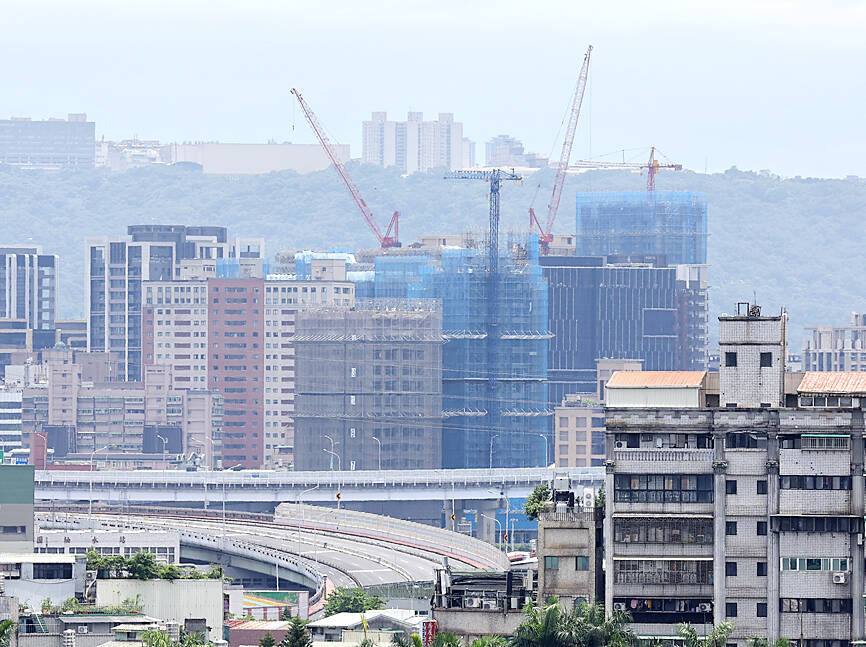Unsold presale houses totaled 47,108 units in northern Taiwan as of last month, accounting for 27.7 percent of the overall volume for sale, heaping price correction pressures on developers, a report by My Housing Monthly (住展雜誌) said on Thursday.
The upcoming ban on transfers of presale house purchase agreements, which the government is still fine-tuning to settle details such as when and how to implement it, would add difficulty to their digestion, the magazine’s research manager Chen Tsai-chi (成采錡) said.
Property transactions, including presale house contracts, tumbled 28 percent year-on-year in the first two months of this year, government data showed, as economic uncertainty and interest rates hikes drove potential buyers to the sidelines.

Photo: CNA
Many developers have opted to postpone or extend construction, giving them more time to digest inventory and ease selling pressure, Chen said.
As of last month, Taoyuan had the highest number of unsold presale houses at 18,115 units, followed by New Taipei City’s 17,520 units, the report said, adding that the number in Yilan County and Keelung were small in comparison at less than 2,000 units.
New Taipei City’s Tamsui District (淡水) had the heaviest supply at 4,013 units, concentrated mainly between Tamsui New Township (淡海新市鎮) and Hongshulin (紅樹林) MRT Station.
Fifteen districts in northern Taiwan had more than 2,000 unsold presale units — Tamsui, Sanchong (三重), Tucheng (土城), Linkou (林口), Wugu (五股) and Jhonghe (中和) in New Taipei City and Bade (八德), Lujhu (蘆竹), Dayuan (大園), Yangmei (楊梅), Jhongli (中壢) and Gueishan (龜山) in Taoyuan, it said.
Unsold presale houses in New Taipei City’s Sanchong District numbered more than 3,000, but are relatively popular due to improving infrastructure and its proximity to the capital, Chen said.
By contrast, projects in Gueishan and Jhongli districts and elsewhere in Taoyuan have been waiting for buyers for extended periods and might become the targets of price concessions given relatively heavy supply, Chen added.

Macronix International Co (旺宏), the world’s biggest NOR flash memory supplier, yesterday said it would spend NT$22 billion (US$699.1 million) on capacity expansion this year to increase its production of mid-to-low-density memory chips as the world’s major memorychip suppliers are phasing out the market. The company said its planned capital expenditures are about 11 times higher than the NT$1.8 billion it spent on new facilities and equipment last year. A majority of this year’s outlay would be allocated to step up capacity of multi-level cell (MLC) NAND flash memory chips, which are used in embedded multimedia cards (eMMC), a managed

CULPRITS: Factors that affected the slip included falling global crude oil prices, wait-and-see consumer attitudes due to US tariffs and a different Lunar New Year holiday schedule Taiwan’s retail sales ended a nine-year growth streak last year, slipping 0.2 percent from a year earlier as uncertainty over US tariff policies affected demand for durable goods, data released on Friday by the Ministry of Economic Affairs showed. Last year’s retail sales totaled NT$4.84 trillion (US$153.27 billion), down about NT$9.5 billion, or 0.2 percent, from 2024. Despite the decline, the figure was still the second-highest annual sales total on record. Ministry statistics department deputy head Chen Yu-fang (陳玉芳) said sales of cars, motorcycles and related products, which accounted for 17.4 percent of total retail rales last year, fell NT$68.1 billion, or

In the wake of strong global demand for AI applications, Taiwan’s export-oriented economy accelerated with the composite index of economic indicators flashing the first “red” light in December for one year, indicating the economy is in booming mode, the National Development Council (NDC) said yesterday. Moreover, the index of leading indicators, which gauges the potential state of the economy over the next six months, also moved higher in December amid growing optimism over the outlook, the NDC said. In December, the index of economic indicators rose one point from a month earlier to 38, at the lower end of the “red” light.

MediaTek Inc (聯發科) shares yesterday notched their best two-day rally on record, as investors flock to the Taiwanese chip designer on excitement over its tie-up with Google. The Taipei-listed stock jumped 8.59 percent, capping a two-session surge of 19 percent and closing at a fresh all-time high of NT$1,770. That extended a two-month rally on growing awareness of MediaTek’s work on Google’s tensor processing units (TPUs), which are chips used in artificial intelligence (AI) applications. It also highlights how fund managers faced with single-stock limits on their holding of market titan Taiwan Semiconductor Manufacturing Co (TSMC, 台積電) are diversifying into other AI-related firms.